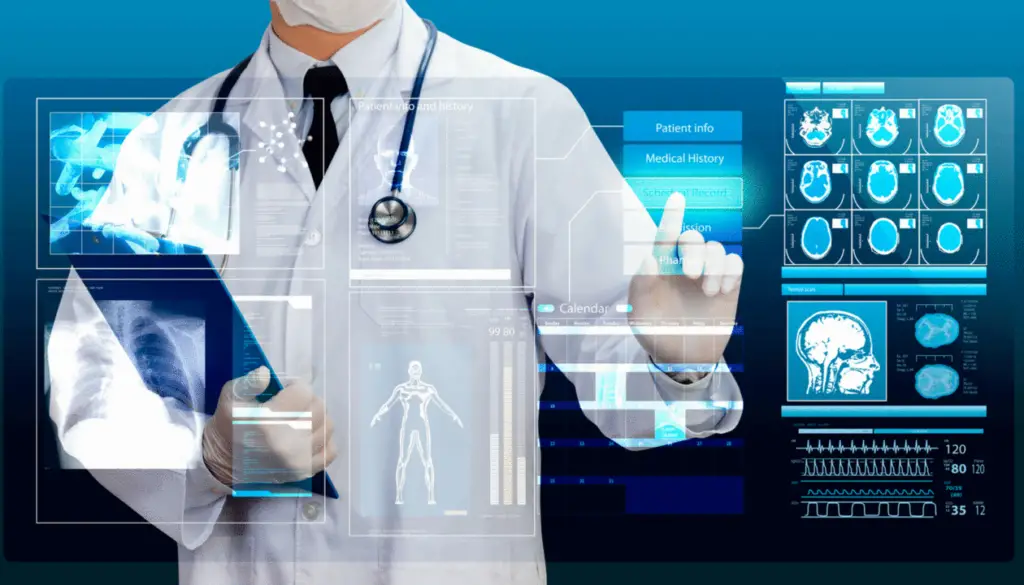Artificial intelligence (AI) is rapidly transforming the healthcare landscape. From developing new diagnostic tools to analyzing vast amounts of medical data and even assisting in surgery, AI has the potential to revolutionize the way we diagnose, treat, and manage diseases. However, this exciting new frontier also raises concerns about patient privacy and potential biases within AI algorithms.
One of the most promising applications of AI in healthcare lies in diagnostics. AI-powered tools can analyze medical images, such as X-rays and MRIs, with incredible accuracy, potentially leading to earlier and more precise diagnoses. This can be particularly beneficial in detecting cancers and other diseases at their earliest stages, when treatment is most effective.
AI’s ability to analyze vast datasets of medical records is another game-changer. By identifying patterns and correlations in patient data, AI can help healthcare professionals predict potential health risks, personalize treatment plans, and develop more effective therapies. This data-driven approach holds immense potential for improving patient outcomes.
AI is also making its way into the operating room. Robotic surgery systems guided by AI are increasing in precision and efficiency, potentially leading to less invasive procedures, faster recovery times, and improved surgical outcomes.
However, alongside the undeniable benefits, there are concerns that need to be addressed. Patient privacy is paramount, and ensuring the security of sensitive medical data used to train and operate AI systems is crucial.
Furthermore, AI algorithms are only as good as the data they are trained on. Biases within the data can lead to biased algorithms, potentially leading to misdiagnoses and unequal access to healthcare.
To ensure AI fulfills its potential in healthcare, robust ethical guidelines and regulations are necessary. Transparency in how AI algorithms are developed and used is key, along with ongoing monitoring to mitigate bias.
In conclusion, AI in healthcare presents a future filled with both immense promise and significant challenges. By acknowledging the potential risks and taking steps to mitigate them, we can harness the power of AI to revolutionize healthcare, ultimately leading to better care for all.
Unveiling Potential: How AI is Transforming Healthcare
One of the most promising applications of AI in healthcare lies in diagnostics. AI-powered tools can analyze medical images, such as X-rays and MRIs, with incredible accuracy, potentially leading to earlier and more precise diagnoses. This can be particularly beneficial in detecting cancers and other diseases at their earliest stages, when treatment is most effective. For instance, AI algorithms are being trained to identify subtle signs of lung cancer in low-dose CT scans, a crucial step in early detection.
AI’s ability to analyze vast datasets of medical records is another game-changer. By identifying patterns and correlations in patient data, AI can help healthcare professionals predict potential health risks, personalize treatment plans, and develop more effective therapies. This data-driven approach holds immense potential for improving patient outcomes. Imagine a future where AI can analyze a patient’s medical history, genetic data, and lifestyle factors to predict their risk of developing a particular disease. This would allow for preventive measures to be taken before the disease even manifests.
AI is also making its way into the operating room. Robotic surgery systems guided by AI are increasing in precision and efficiency, potentially leading to less invasive procedures, faster recovery times, and improved surgical outcomes. For instance, AI-assisted robotic arms can perform delicate surgical maneuvers with unmatched precision, minimizing tremors and human error.

Navigating the Challenges: Privacy, Bias, and Ethical Considerations
However, alongside the undeniable benefits, there are concerns that need to be addressed. Patient privacy is paramount, and ensuring the security of sensitive medical data used to train and operate AI systems is crucial. Robust cybersecurity measures and clear data governance practices are essential to prevent unauthorized access and misuse of patient information.
Furthermore, AI algorithms are only as good as the data they are trained on. Biases within the data can lead to biased algorithms, potentially leading to misdiagnoses and unequal access to healthcare. For example, if an AI algorithm trained on a dataset with historical biases against certain demographics is used for patient risk assessment, it could lead to inaccurate predictions and unequal access to treatment.
